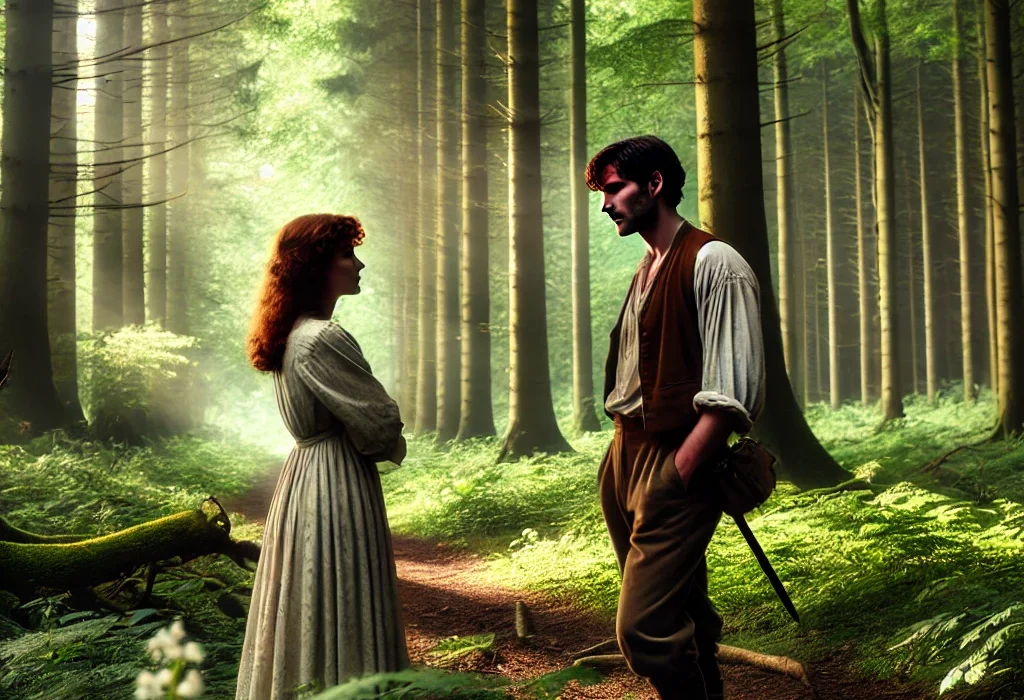“Lady Chatterley’s Lover” is a provocative novel by D.H. Lawrence, published in 1928. Set in post-World War I England, the novel explores the complexities of human relationships, the conflict between the mind and body, and the stark contrast between different social classes. It gained notoriety for its explicit depictions of physical intimacy and its open discussion of sexuality, challenging the rigid norms of its time. The story follows Constance Reid, or Lady Chatterley, as she navigates her emotional and physical desires in a strained marriage with a paralyzed war veteran, Sir Clifford Chatterley.
Plot Summary
Constance Chatterley, known to most as Lady Chatterley, found herself trapped in a life that felt suffocating and desolate. Born into an intellectual family, she was raised amidst discussions of art and idealism, her upbringing fostering an independent spirit. But that spark of freedom had been steadily smothered by the realities of her marriage to Sir Clifford Chatterley. Clifford, once an active and capable man, had returned from the Great War paralyzed from the waist down. His injury left him confined to a wheelchair, but it was the emotional distance between them that troubled Connie the most. Clifford, now more interested in his writing and intellectual endeavors, sought refuge in his mind, leaving behind the passion and intimacy that once might have connected them.
Wragby Hall, the Chatterleys’ estate in the Midlands, became a prison for Connie. The stark industrial landscape around the estate, dominated by the nearby coal mines, mirrored the bleakness of her own life. Clifford had thrown himself into managing the coal mines and writing stories, finding solace in his growing reputation as an intellectual. Yet despite his achievements, Clifford remained disconnected from the world of feelings and from Connie herself. As the days slipped by, Connie grew increasingly restless. The emotional void between her and Clifford deepened, as he found companionship in his nurse, Mrs. Bolton, who provided him the care and attention he needed. But for Connie, there was no such comfort, only a deepening sense of isolation.
Into this desolation stepped Oliver Mellors, the gamekeeper at Wragby. Mellors had returned to England after serving in the war, much like Clifford, but unlike the Chatterleys, he had no grand estate or title. He lived a simple life, tending to the woods and his cottage, disconnected from the upper class to which the Chatterleys belonged. His isolation was self-imposed, for he had little patience for the world of industry and intellect that seemed to dominate post-war England. He preferred the quiet of the natural world, a sanctuary untouched by the grime and smoke of the nearby mines.
It was in these woods that Connie first encountered Mellors. He was a man of few words, but there was a quiet strength about him, a connection to the earth that intrigued her. Over time, she found herself drawn to him, not just physically but emotionally, for he represented something vital that was missing from her life—an untamed passion, a return to the primal forces of life that she had forgotten. Their meetings, at first awkward and filled with tension, soon blossomed into something deeper. With Mellors, Connie rediscovered her body, her desires, and the part of her spirit that had been suppressed for so long.
As their affair deepened, Connie felt a growing distance from Clifford. He, consumed by his writing and the praise it garnered, seemed oblivious to the transformation occurring within his wife. Their marriage had become a hollow shell, sustained by duty rather than love. Clifford’s physical limitations only exacerbated his detachment, as he grew more reliant on Mrs. Bolton for his daily care and companionship. The chasm between him and Connie widened, yet Clifford, ever the intellectual, remained focused on his work, unaware of the emotional upheaval that Connie was experiencing.
The relationship between Connie and Mellors grew not only in physical intimacy but also in emotional depth. They spent more time together, hidden away in Mellors’ cottage in the woods, where the world outside seemed to disappear. Here, away from the constraints of society and class, they found solace in each other. Mellors, scarred by his own experiences of love and war, was slow to trust, but with Connie, he allowed himself to be vulnerable. In each other, they found a sanctuary from the loneliness that had haunted them both.
However, their relationship could not remain hidden forever. Connie began to entertain thoughts of leaving Clifford, of abandoning the life of privilege that had become a gilded cage. She knew that society would never accept a relationship between a Lady and a man of Mellors’ station, but the thought of continuing her life without the passion she had found seemed unbearable. She confided in her sister, Hilda, who disapproved of the affair but understood Connie’s unhappiness. Together, they planned a way for Connie to escape the confines of her marriage and be with Mellors.
Yet the world outside their secluded love could not be so easily ignored. Clifford, while largely blind to Connie’s emotional struggles, was not completely oblivious to the changes in her demeanor. Suspicion crept into his mind, and he began to rely more heavily on Mrs. Bolton, who subtly encouraged his growing sense of isolation. As Clifford’s health deteriorated, so too did his grip on Connie, leaving her free to pursue the life she longed for, though not without a price.
The final test came when Connie realized she was pregnant with Mellors’ child. The weight of this new life growing inside her brought urgency to her decision. She could no longer remain at Wragby, bound by duty to a man she no longer loved. With a quiet determination, Connie prepared to leave Clifford and the world of privilege behind. Mellors, too, faced his own trials, as his position as a gamekeeper came under threat from those who looked down on him for daring to love a woman above his station.
In the end, Connie and Mellors stood at the edge of a new life together, uncertain of the future but certain of the love that had grown between them. It was a love that defied the rigid boundaries of class and convention, a love rooted in the raw, untamed forces of nature. And though they faced the scorn of society, they found strength in each other, ready to embrace whatever lay ahead
Main Characters
Constance (Connie) Chatterley: The protagonist of the novel, Connie is a passionate and sensitive woman in her twenties. Raised in an intellectual family, she is initially devoted to her husband but grows increasingly restless and disillusioned with their emotionally distant relationship. Her affair with the gamekeeper, Mellors, becomes a profound exploration of love, physical desire, and personal freedom.
Sir Clifford Chatterley: Connie’s husband, Clifford, is an aristocrat who becomes paralyzed from the waist down after serving in World War I. His physical incapacity exacerbates his emotional detachment, leading him to focus on his intellectual pursuits and writing. Clifford is portrayed as cold and distant, with a sense of superiority that deepens the emotional chasm between him and Connie.
Oliver Mellors: The gamekeeper at Wragby Hall, Mellors is a complex, introspective character who has a deep connection to nature and a disdain for the industrialization of the modern world. His passionate affair with Connie provides her with the emotional and physical fulfillment that her marriage lacks. Mellors is a symbol of natural, untamed desire in contrast to the mechanical and intellectual world of Sir Clifford.
Mrs. Bolton: Clifford’s nurse and caregiver, Mrs. Bolton is a lower-class woman who forms a bond with Clifford. She provides him with care and companionship, yet her role underscores the class tensions and the dependency Clifford faces as a result of his paralysis.
Theme
Class Division and Industrialization: The novel explores the rigid class structures in post-war England, contrasting the aristocratic world of Clifford with the working-class life of Mellors. The encroachment of industrialization, symbolized by the coal mines surrounding Wragby Hall, serves as a backdrop to the emotional and social alienation of the characters.
Physical and Emotional Intimacy: A central theme in “Lady Chatterley’s Lover” is the tension between intellectual connection and physical desire. Lawrence contrasts the sterile intellectualism of Clifford with the raw, physical passion Connie experiences with Mellors, suggesting that true fulfillment comes from an integration of mind and body.
Nature vs. Modernity: Mellors’ character is closely associated with nature, representing a return to instinctive, primal living, in opposition to the dehumanizing effects of modernity and industrialization. Lawrence critiques the mechanization of life and the detachment it creates from human emotion and natural instincts.
Feminine Sexual Liberation: Connie’s journey is one of sexual and emotional liberation. Through her relationship with Mellors, she defies the societal norms of her class and time, discovering a sense of freedom and fulfillment in embracing her desires.
Writing Style and Tone
Lawrence’s writing in “Lady Chatterley’s Lover” is deeply lyrical and introspective, with rich descriptions of nature and the human body. His narrative style is often meditative, drawing readers into the internal worlds of his characters, especially Connie, whose emotional and sexual awakening is central to the novel. The novel’s explicit language and vivid portrayals of physical intimacy were revolutionary for its time, pushing the boundaries of what was considered acceptable in literature.
The tone of the novel fluctuates between somber and sensuous. Lawrence examines the disillusionment of post-war England with a critical, almost melancholic tone, especially in the portrayal of Clifford and the industrial landscape. In contrast, his depiction of the relationship between Connie and Mellors is charged with sensuality, highlighting the power and beauty of human physicality. Lawrence’s use of symbolism, particularly in the natural imagery surrounding the lovers, creates a sense of earthy vitality that contrasts with the cold, intellectual sterility of Wragby Hall.
We hope this summary has sparked your interest and would appreciate you following Celsius 233 on social media:
There’s a treasure trove of other fascinating book summaries waiting for you. Check out our collection of stories that inspire, thrill, and provoke thought, just like this one by checking out the Book Shelf or the Library
Remember, while our summaries capture the essence, they can never replace the full experience of reading the book. If this summary intrigued you, consider diving into the complete story – buy the book and immerse yourself in the author’s original work.
If you want to request a book summary, click here.
When Saurabh is not working/watching football/reading books/traveling, you can reach him via Twitter/X, LinkedIn, or Threads
Restart reading!








